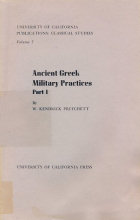
PRITCHETT : Ancient Greek military practices : Part I (bevezetés)
NO COMPLETE study of ancient Greek warfare is possible at the present time because of the diversity of the archaeological evidence and the fragmentary nature of the literary information. One could draw a parallel to the field of Greek religion, of which M. P. Nilsson said, after a lifetime of research in the field, that we still can form no clear picture of what the average Greek of those times thought and felt concerning religious matters.1 He charted the only prudent course as one of continuing with minute and patient research and of avoiding loose speculations. Nilsson's remarks apply with equal cogency to the study of Greek warfare. It is impossible to avoid all the pitfalls lying in the path of one who tries to recapture the nature of military life of a past age, reflected only in incomplete comments of those who lived in it.
Moreover, a truly definitive history of Greek warfare would require a knowledge of many aspects of Greek life. The would-be investigator would have to be familiar with terrain in the case of any given battle, have an acquaintance with the archaeological artifacts of various types, close familiarity with the written sources, and, most important, an understanding of the general economic picture. He would also need some insight into ancient religion and acquaintance with military and naval procedures and strategy. Finally, since the polis in its demands and its tasks was the center of the life of the individual citizen, a thorough understanding of constitutional procedures is necessary.
In the course of my topographical researches on ancient battlefields and routes, I have frequently come across isolated problems which have not up to now been sufficiently investigated. I decided to make a beginning, hoping that this volume might be a precursor to others. This book, which deals with the more mundane matters of the needs of an army in the field, is in a sense complementary to the recent study on tactics by my colleague Professor J. K. Anderson, Military Theory and Practice in the Age of Xenophon (Berkeley 1970).
The first six chapters, relating to pay and sustenance, have a common economic theme; the other chapters are more discursive. My method is emphasis on the collecting of factual material : to assist other scholars in the discovery of passages which may have escaped my notice, I have often presented tables of testimonia. It would be presumptuous of me to believe that I am myself conversant with all of the ancient evidence. I hope this approach will lead other scholars to proceed further with the study.
In many chapters, the method has been philological—that is, I have started with a study of vocabulary. Here incompleteness is axiomatic, because there are no adequate lexicons for several of the most voluminous Greek writers, including Diodoros, Pausanias, Xenophon, and Plutarch, as well as the tacticians, with the exception of Aineias.
The spelling of Greek names presents a perpetual problem. The practice of transliterating personal and place names is becoming increasingly common in Greek historical studies, a practice which was observed, for example, by Gildersleeve in the early numbers of the American journal of Philology, and is now followed in the RE and other works intended for an international audience. I prefer Makedonia, Arkadia, and Kerkyra, for example, to the anglicized forms; but this spelling admittedly results in such hybrid forms as Makedonians, Arkadians, and Kerkyraeans. On the other hand, Makedonioi, Arkades, and Kerkyraioi look strange. Some familiar names I anglicize.
I wish to acknowledge the assistance at various times of Messrs. J. Breslin, P. Harding (in chapter X), C. Weber (in chapter XI), and W. Jones, graduate students in my seminars at Berkeley. Mrs. T. Carp has checked the references in most of the chapters; Mr. U. Sanchez those in the remainder. The manuscript was carefully typed by Miss Marcia Toy. Some parts have been read by Professors R. Sealey, R. Stroud, and C. Greenewalt, and I have appreciated their criticisms. Professor Joseph Fontenrose has saved me from several infelicities of phrasing and word choice, and a reading of his review in AJP 91 (1970) has spared me others. Some financial assistance has come from the Committee on Research and the Work Studies Program of the University of California. My wife, as always, has rendered aid of various kinds.
The manuscript was completed in July, 1970.
1 Geschichte der griechischen Religion 12 (Munich 1955) 844. [vissza]